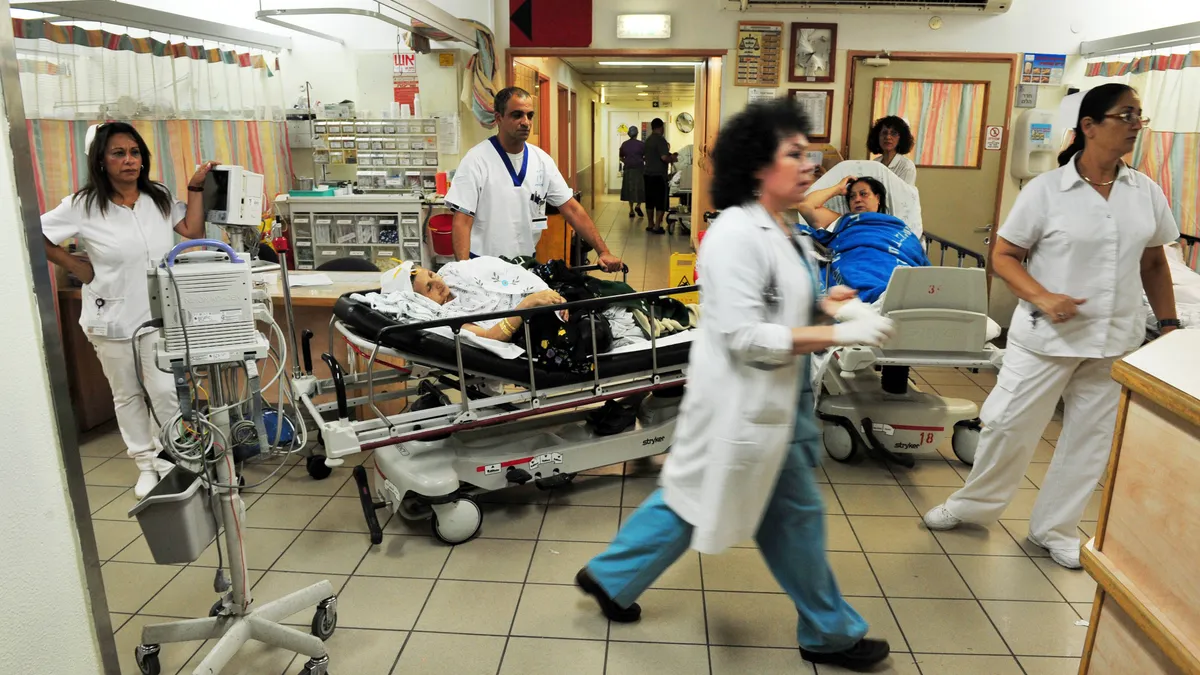Dive Brief:
- The Joint Commission on Tuesday affirmed the value of healthcare workers wearing protective masks throughout their day to protect themselves against the coronavirus, even if that means letting workers bring their own.
- Emergency physicians and nurses have been pleading for better working conditions while treating COVID-19 patients, including the ability to bring in outside masks and gowns amid shortages at some facilities. The American College of Emergency Physicians said its members are being reprimanded for wearing makeshift personal protective equipment despite hospitals being under supplied.
- The largest union of registered nurses in the country, National Nurses United, has filed over 125 complaints with Occupational Safety and Health Administration offices in 16 states, charging individual hospitals with failing to provide safe workplaces. Most concern insufficient PPE claims, along with improper isolation rooms for infected or suspected COVID-19 patients
Dive Insight:
The Joint Commission's statement notes that allowing staff to wear masks of any kind throughout the day should help prevent the spread of COVID-19 inside hospitals, although supporting evidence remains incomplete.
"The degree to which privately-owned masks and respirators will increase the protection of healthcare workers is uncertain, but the balance of evidence suggests that it is positive," the group said in its statement.
It’s unclear exactly how many healthcare workers have tested positive for the virus as case numbers overall continue to rise. The ACEP said two of its members — a 70-year-old in New Jersey and Washington State physician in their 40s — tested positive and were intubated in critical condition on March 14.
The Centers for Disease Control and Prevention has changed its guidance regarding PPE for COVID-19 several times since the US outbreak began, leaving hospitals and workers scrambling to keep up.
The most recent guidelines suggest in settings where face masks are not available, workers may use homemade masks, such as bandanas or scarves, for care of patients with COVID-19 as a last resort. Some hospitals, however, have policies against using outside or homemade equipment.
Gillian Schmitz, vice president of ACEP, said hospitals are interpreting the murky rules differently, and some have penalized workers for wearing makeshift PPE.
"We are asking to allow them to bring in their own PPE from home if they don't have sufficient supplies in hospitals," Schmitz said. "We want our members to be able to speak out and to be able to take measures to protect themselves and patients."
According to OSHA, nurses, doctors, lab and morgue workers make up the highest risk groups out of all occupations for COVID-19 exposure.
Schmitz said healthcare workers have been prioritized for testing if symptomatic, despite widespread shortages. But suspected exposure alone doesn’t warrant a test.
Schmitz herself was recently exposed in New York but asymptomatic. She wasn’t tested because there weren't enough kits, she said, so she self-quarantined for 14 days, unable to see patients.
Nurses are also rallying for safer working conditions in hospitals around the country while they deal with a lack of PPE and oscillating CDC guidance.
In addition to filing over 125 OSHA complaints, members of National Nurses United also submitted over 1,400 electronic complaints directly to employers citing similar concerns, the union said.
"With these filings, we are making it clear to both the hospitals and our state regulatory agencies that they have an essential job to do to protect public health and safety," Stephanie Roberson, legislative director for the California Nurses Association, said in a release.
"If they don’t act now, our hospitals will quickly become overwhelmed with patients, and we will face a dire shortage of nurses who will themselves be sickened and no longer available to care for patients," Roberson said.












